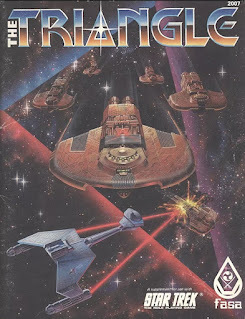Retrospective: The Triangle
 In the comments to last week's Retrospective about
Trader Captains and Merchant Princes
for FASA's Star Trek the Role Playing Game, an anonymous reader mentioned The Triangle, which he called "bar none ... my favorite RP supplement." The comment was fortuitous (and prescient), because I had already intended to look at The Triangle this week. Though usable for any type of Star Trek RPG campaign, it's an especially good fit in my opinion for merchant-based campaigns, which, from what I gather, is what most people who owned did with this 92-page supplement.
In the comments to last week's Retrospective about
Trader Captains and Merchant Princes
for FASA's Star Trek the Role Playing Game, an anonymous reader mentioned The Triangle, which he called "bar none ... my favorite RP supplement." The comment was fortuitous (and prescient), because I had already intended to look at The Triangle this week. Though usable for any type of Star Trek RPG campaign, it's an especially good fit in my opinion for merchant-based campaigns, which, from what I gather, is what most people who owned did with this 92-page supplement.The Triangle takes its name from an area of space that lies between the territories claimed by the United Federation of Planets and Klingon and Romulan Empires. Consisting of a little more than 120 class M worlds, most of which are independent of any of the aforementioned great powers, the Triangle is a contested area, filled with danger, mystery, and lots of opportunities to turn a credit. That makes it an ideal place to set a campaign, especially if you're interested in interstellar intrigue in the Star Trek universe – or at least FASA's interpretation of that universe.
That's an important thing to bear in mind. The Triangle was first released in 1985. At that point in time, there were only three movies and The Next Generation was still two years in the future. And while there were a good number of novels and comic books, the concept of a Star Trek "canon" as the word is used today was very loose, almost to the point of non-existence. Consequently, each licensee was largely free to develop the setting in whatever way it chose and without regard for – and sometimes in contradiction of – how any other licensee did so. I know it's hard to imagine
FASA took full advantage of this creative freedom to flesh out their own unique take on the Star Trek universe, one that, in retrospect, has a decidedly Cold War edge to it, with the Federation standing in for NATO and the Klingons and Romulans for different aspects of the Warsaw Pact. It wasn't quite as overtly militaristic as, say, Starfleet Battles, as it tempered its power politics with elements sincere idealism, but it also wasn't quite as wide-eyed as The Next Generation regularly was. It was a vision of the 23rd century that reflected the tensions and concerns of the mid-1980s and so probably would feel a bit dated to some today. At the time, though, I loved it.
The Triangle makes the most sense when viewed in this context. This is an area of space filled with mostly independent worlds whom each of the three nearby major powers wishes to sway to their side, whether for noble or cynical reasons, reminiscent of the way that the United States and the Soviet Union used Third World nations as pawns in their Great Game. But because no one wishes to ignite an interstellar war, they must act with caution – and often covertly – lest they light the spark that throws everything into chaos. As I said, it's a great place to set a campaign.
In addition to the Federation, the Klingons, and the Romulans, The Triangle introduces us to several other regional powers. The Affiliation of Outer Free Worlds is a Federation-friendly – but still independent – coalition of planets. The Orion Frontier Mercantile Association is a front for moneyed Orion interests to exploit the worlds of the Triangle. The Imperial Klingon States is a breakaway Klingon government headed by an admiral who failed in his attempt to seize the throne. The Mantiev Colonial Association is another coalition of worlds but one whose fractious politics have brought to the brink of civil war, with each faction backed by one of the major powers.
In addition to fleshing out these regional powers, The Triangle details every individual world, along with significant NPCs, new alien races, and corporations. There's also information of trade routes and black markets, both of which are essential if it's used in conjunction with Trader Captains & Merchant Princes. Of course, the Triangle works just as well as the setting for campaigns focusing on Federation or Klingon ships and characters. The book provides lots of hooks for referees looking to run almost any sort of adventure you can imagine in the Star Trek universe – exploration, rescue missions, espionage, diplomacy, and more. It's jam packed with ideas. Even if you find only a few of them of immediate interest, The Triangle has more than enough to keep a campaign moving for months or years.
I had a lot of fun with The Triangle after its release, using it as the basis primarily for merchant adventures. Unfortunately, I didn't use it for very long, though mostly for reasons having nothing to do with the supplement itself. In fact, I enjoyed it so much that I had hoped I'd get the chance to referee a long-running campaign in the region. The book certainly provides enough ideas on which to build such a campaign, which is my usual metric for determining the value of a gaming supplement, hence why I think so highly of The Triangle.
James Maliszewski's Blog
- James Maliszewski's profile
- 3 followers



